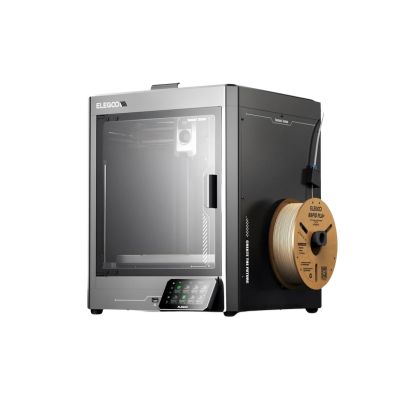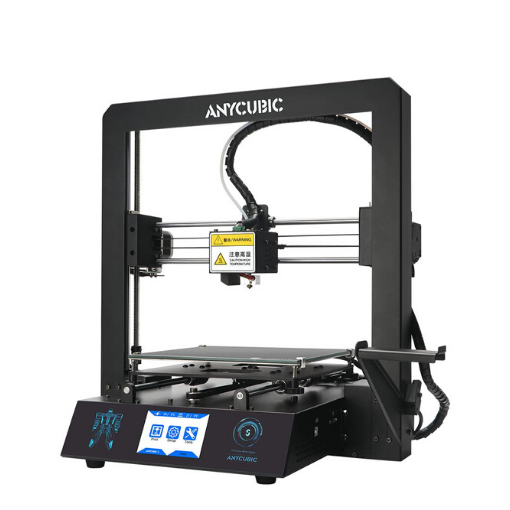Compare Centauri Carbon vs Mega S
Comparison between the best 3D printers
Choose the best 3D printer at the best price. The cheapest 3D printers are here.
Buy a 3D printer here with 3D Fila.
 |
 |
|
| Model | Centauri Carbon |
Mega S |
| Printing Material | Filament | Filament |
| Buy Filament for Elegoo Centauri Carbon | Buy Filament forAnycubic Mega S | |
| Estimated price | $500,00 | $149,00 |
| Manufacturer | Elegoo | Anycubic |
| Release Year | 2025 | 2019 |
| Print Volume [mm] | 256x256x256 | 210x210x205 |
| Printer Size [mm] | 500x500x600 | 405x410x452 |
| Weight [kg] | 17,5 | 14,5 |
| Power Loss Recovery | YES | YES |
| Enclosed printer | YES | NO |
| Bed Leveling | Automatic | Manual |
| Filament End Sensor | YES | YES |
| Bed type | Heated | Heated |
| Power supply system | Direct Drive | Bowden |
| Standard nozzle | 0,4 | 0,4 |
| Maximum Nozzle Temperature [°C] | 300 | 260 |
| Maximum Bed Temperature [°C] | 110 | 110 |
| Maximum printing speed [mm/s] | 500 | 100 |
| Filament holder | YES | YES |
| Camera for supervision | YES | YES |
| Recommended filaments | PLA, PETG, ABS, ASA, TPU, NYLON, CARBON FIBER | PLA, TPU, ABS, PETG |
| Recommended slicers | Elegoo Slicer, Orca Slicer | Cura, Simplify, Slic3r |
| Maximum Resolution [mm] | 0,1 | 0,1 |
| Processor | 8 bits | |
| Display | Touchscreen 4,3'' | Touchscreen TFT 2,8'' |
| Power Supply | 350 W | 12V / 300W |
| Connectivity | WiFi, SD, USB | SD / USB |
| Operating systems | Windows, Linux e Macbook | Windows, Mac, Linux |
| Date of registration in the system | 2025-02-10 | 2021-04-15 |
| Release date | 2025 | 2019 |
| Extra features | The Elegoo Centauri Carbon is a CoreXY 3D printer with an enclosed structure, direct drive extruder, and hardened steel components for abrasive materials. It features automatic bed leveling, a touchscreen, a filament cutting system, and an elongated nozzle designed to reduce clogs. It offers Wi-Fi connectivity for remote file transfer and runs on a Klipper-based firmware, providing advanced control and precise adjustments. | The Anycubic Mega S offers a printing platform with excellent adhesion, easy removal after cooling. It has a filament sensor for a better experience with flexible materials and a multilingual and intuitive color touchscreen. Assembly is quick, requiring only 8 screws and 3 connections. It has a large build volume (210 x 210 x 205 mm), high positioning accuracy and supports a variety of materials, including TPU, PLA, ABS and wood. It stands out for its solid metal structure, superior stability, high-quality printing with layer resolution of up to 50 microns, Ultrabase for easy adhesion and removal of parts, resumption of printing after power outage, high-quality extruder for flexible filaments, suspended filament support and stable structure that reduces shaking, improving printing quality. |
| Support for multiple colors and materials (AMS and CFS) | NO | NO |
Notes * |
||
| Cost-benefit | 8 / 10 | 7 / 10 |
| Hardware | 5.4 / 10 | 2 / 10 |
| Tela | . | . |
| Print volume | 4 / 10 | 3 / 10 |
| Performance | 4 / 10 | 1 / 10 |
Conclusion |
| In comparing the Elegoo Centauri Carbon and the Anycubic Mega S, several key factors influence the decision-making process for potential buyers looking for the best 3D printer at a compelling price point. The Centauri Carbon offers a more advanced printing experience as it was released in 2025, making it the newer model equipped with an enclosed structure, automatic bed leveling, and a direct drive extruder. Its larger print volume allows for a wider range of project possibilities, and the printer's advanced features, such as Wi-Fi connectivity and support for a variety of filament types, enhance its usability and versatility. Additionally, its higher print speeds, while maintaining a similar resolution capability as the Mega S, further demonstrate its performance potential. On the other hand, the Anycubic Mega S, having been released in 2019, is a more budget-friendly option that still delivers quality and reliability. It features a solid metal structure and a straightforward assembly process, making it accessible for beginners. While its print volume and overall capability are more limited compared to the Centauri Carbon, the Mega S offers essential functionalities such as a heated bed and manual bed leveling, ensuring satisfactory prints for hobbyists and light users. In conclusion, the choice between these two printers hinges on the user’s specific needs and budget. If advanced features, larger print capacity, and material versatility are priorities, and the budget allows, the Elegoo Centauri Carbon presents a strong case for its value. Conversely, for users looking for an affordable and reliable entry-level printer without the necessity of advanced functionalities, the Anycubic Mega S is a commendable choice, offering solid performance at a lower price point. Ultimately, both printers have their merits, and potential buyers should weigh their options based on their individual printing requirements and financial considerations. |

